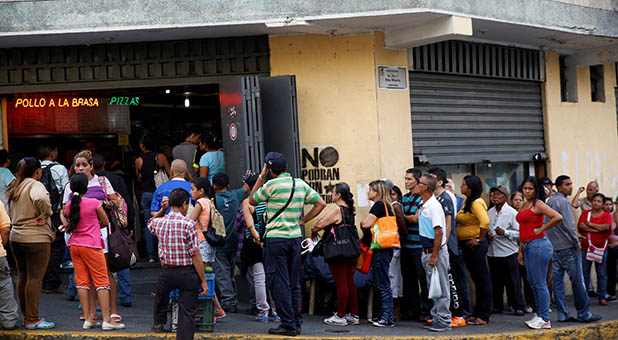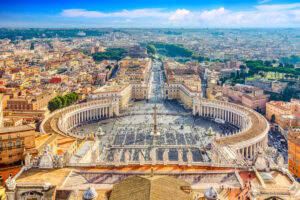Many Millennials are finding socialism attractive—at least as presented by Bernie Sanders. This is perplexing because there is ample and dramatic evidence of how a full-fledged socialist state fails its own citizens so miserably.
Witness Venezuela. Fifteen years under socialist Hugo Chavez followed by three years under his socialist successor, Nicolas Maduro, have left the economy in shambles and the living standards of Venezuelans falling to a level that can only be described as intolerable. Why and how does this happen in Venezuela or in any other country that embraces the false, deceitful, utopian promises of socialist politicians?
The policies that socialist leaders invariably embrace turn their socialist dreams into nightmares. Fundamentally, socialist regimes seek to destroy markets and market prices, the fundamental institutions of an exchange economy. Socialist ideologues maintain that the prices of goods are arbitrarily fixed by business exploiters at artificially high levels. Therefore, they can and should be controlled by law.
Chavez’s Venezuela is a classic case. Price controls, that is, the government setting the price of certain goods below what would be a normal market price, first began with “essentials” like sugar, cooking oil, coffee, beans and powdered milk, with some of these being controlled since 2003. In November 2011, Chavez announced that he was about to establish additional price controls on some 15,000 goods. From the start, the promise of the Venezuelan socialist was to make the price-controlled goods more “affordable” for their citizens. However, the result is just the opposite. Shortages became the norm. Production declined. Today, the hapless “masses” which socialism was supposed to help are facing what the Venezuelan government euphemistically calls a “nutritional emergency.” Why?
During the decades of continuing price controls, the profits of farmers and other processors were eliminated through the artificially low state-mandated prices. What happened to the coffee-roasting companies beginning in 2006 is a typical scenario. First, some coffee producers simply held supplies off of the market in hopes the government would agree to price increases that covered their costs. The government countered with military force, authorizing the National Guard to “find every last kilogram of coffee” being “hoarded.” By 2009 the Venezuelan government seized control of two of the largest coffee-processing plants, claiming that the private companies were engaged in hoarding and smuggling coffee and therefore being disloyal to the state. Shortly thereafter, Chavez nationalized the two largest coffee enterprises. However, the government running the plants produced no benefits for the consumers. Today, market analyst Luis Vicente Leon sums it up this way: “They [the government] expropriate the sugar companies, and you cannot find sugar … They expropriate the coffee companies … and you cannot find coffee. They expropriate Owen-Illinois, and we cannot find packages.”
The second response of suppliers to price controls was to produce the controlled products but smuggle them out of Venezuela to neighboring countries like Colombia where they could receive what Venezuela regards as illegally high “black market” prices. So much of this was occurring that by 2015 the Venezuelan government under Nicholas Maduro “expanded an anti-smuggling offensive along the Venezuelan frontier with Colombia.” He closed border crossings and deported Columbians who were apparently engaged in smuggling contraband goods.
While producers are victimized and harassed, what about Venezuelan consumers? Venezuelan shoppers face shortage after shortage. They line up in Caracas in the wee hours of the morning, standing in a line in front of the state-run grocery stores hoping that they will get something (almost anything) before the meager supply runs out. The government now requires registration with identity cards and fingerprinting in order to shop, all this to prevent “hoarding.” The Economist reports that national guardsmen, fully armed, recently stopped a pregnant woman from shopping because it is not her designated day under the strict rationing rules. In the same article, The Economist says that the empty shelves in Venezuela are eerily reminiscent of the same empty shelves in Robert Mugabe’s claimed socialist paradise, Zimbabwe. Precisely so. Economic laws know no borders. They are not respecters of the empty claims of socialist politicians.
At the very beginning of the increase of price regulation in 2011, Karlin Granadillo, head of the Venezuelan price control agency, proudly proclaimed: “The law of supply and demand is a lie.” Events have confirmed the utter foolishness of such a socialist edict.
Would that Venezuela had a leader who would courageously exclaim to the current President: “Abolish these controls Mr. Maduro! Repeal them for the sake of your fellow citizens!”
Dr. John A. Sparks is the retired dean of Arts & Letters at Grove City College and a fellow for The Center for Vision & Values. He is a graduate of the University of Michigan Law School and a member of the State Bar of Pennsylvania. He is a frequent contributor of articles based upon U.S. Supreme Court developments.
See an error in this article?
To contact us or to submit an article
























